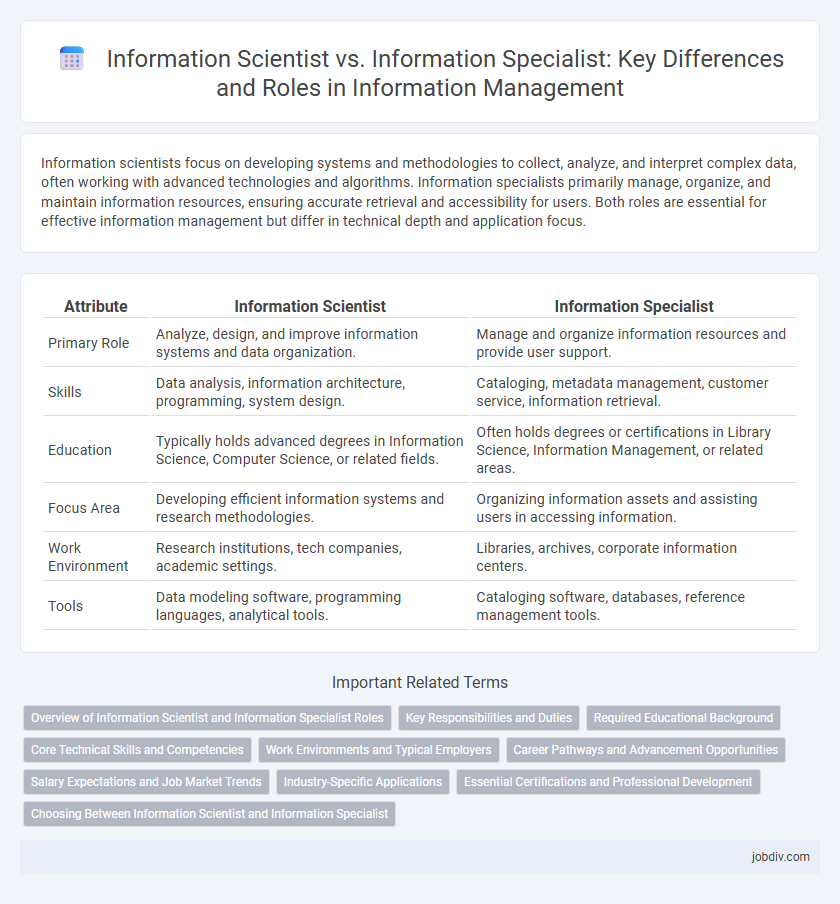Information scientists focus on developing systems and methodologies to collect, analyze, and interpret complex data, often working with advanced technologies and algorithms. Information specialists primarily manage, organize, and maintain information resources, ensuring accurate retrieval and accessibility for users. Both roles are essential for effective information management but differ in technical depth and application focus.
Table of Comparison
| Attribute | Information Scientist | Information Specialist |
|---|---|---|
| Primary Role | Analyze, design, and improve information systems and data organization. | Manage and organize information resources and provide user support. |
| Skills | Data analysis, information architecture, programming, system design. | Cataloging, metadata management, customer service, information retrieval. |
| Education | Typically holds advanced degrees in Information Science, Computer Science, or related fields. | Often holds degrees or certifications in Library Science, Information Management, or related areas. |
| Focus Area | Developing efficient information systems and research methodologies. | Organizing information assets and assisting users in accessing information. |
| Work Environment | Research institutions, tech companies, academic settings. | Libraries, archives, corporate information centers. |
| Tools | Data modeling software, programming languages, analytical tools. | Cataloging software, databases, reference management tools. |
Overview of Information Scientist and Information Specialist Roles
Information Scientists analyze, organize, and interpret complex data to improve information systems and support decision-making processes in various industries. Information Specialists focus on managing, categorizing, and disseminating information resources to ensure accessibility and accuracy for users. Both roles require expertise in data management, but Information Scientists emphasize research and system development while Information Specialists prioritize information organization and user support.
Key Responsibilities and Duties
Information Scientists analyze and organize complex data sets to improve information retrieval systems, develop algorithms, and enhance data accessibility across digital platforms. They design, implement, and evaluate information models using advanced techniques from computer science, information theory, and data analytics. Information Specialists focus on managing, curating, and maintaining information resources, providing expert guidance on information retrieval, user support, and database management within libraries, archives, or corporate environments.
Required Educational Background
Information Scientists typically require advanced degrees such as a Master's or Ph.D. in Information Science, Computer Science, or related fields, emphasizing research, data analysis, and information management techniques. Information Specialists often hold a Bachelor's degree in Library Science, Information Technology, or a related discipline, focusing on practical skills in information organization, retrieval, and user support. Both roles demand strong knowledge of information systems, but Information Scientists engage more deeply in theoretical frameworks and data modeling.
Core Technical Skills and Competencies
Information Scientists possess advanced analytical skills, data modeling expertise, and proficiency in machine learning algorithms, enabling them to extract meaningful insights from complex datasets. Information Specialists excel in information management, metadata creation, and digital archiving, ensuring accurate organization and accessibility of information resources. Both roles require strong knowledge of database systems, information retrieval techniques, and proficiency with relevant software tools to optimize data utilization.
Work Environments and Typical Employers
Information Scientists typically work in research institutions, technology companies, and academic settings where they analyze complex data sets and develop information systems. Information Specialists are commonly employed by libraries, government agencies, and corporate offices, focusing on organizing, managing, and curating information resources. Both roles thrive in environments that require strong data management and information retrieval skills but differ in their emphasis on research versus practical application.
Career Pathways and Advancement Opportunities
Information Scientists typically engage in advanced data analysis, research methodologies, and the development of information systems, positioning themselves for roles in data science, information architecture, and technology leadership. Information Specialists focus on organizing, managing, and disseminating information resources, leading to career advancement in library science, knowledge management, and archival services. Both career pathways offer opportunities for specialization, with Information Scientists often pursuing advanced degrees for research and development roles, while Information Specialists may advance through certification and experience in information management domains.
Salary Expectations and Job Market Trends
Information Scientists typically command higher salaries than Information Specialists, with median annual earnings ranging from $75,000 to $110,000 depending on industry and experience. The job market for Information Scientists is expanding rapidly, driven by demand for data analysis and machine learning expertise, whereas Information Specialists often see steady demand in libraries, archives, and knowledge management roles. Emerging trends indicate a growing preference for Information Scientists in technology-driven sectors, while Information Specialists remain vital in educational and governmental institutions.
Industry-Specific Applications
Information Scientists focus on analyzing and managing data to develop advanced information retrieval systems, particularly within technology, healthcare, and research industries, utilizing machine learning and data mining techniques. Information Specialists apply their expertise in organizing, categorizing, and maintaining data within specific sectors such as libraries, corporate archives, and government agencies, ensuring accurate information accessibility and compliance with regulatory standards. Industry-specific applications require Information Scientists to innovate data algorithms, while Information Specialists emphasize metadata standards and user-centered information delivery.
Essential Certifications and Professional Development
Information Scientists often pursue certifications like Certified Information Professional (CIP) and data analytics credentials, emphasizing advanced analytics, data management, and research methodologies. Information Specialists typically engage in professional development through certifications such as Certified Records Manager (CRM) and Information Governance certifications, focusing on records management, information governance, and compliance. Continuous training in emerging technologies and information systems remains crucial for both roles to maintain expertise and adapt to evolving data landscapes.
Choosing Between Information Scientist and Information Specialist
Choosing between an Information Scientist and an Information Specialist depends on the focus of the role; Information Scientists typically analyze data, develop algorithms, and apply scientific methods to manage and interpret complex information systems. Information Specialists concentrate on organizing, managing, and disseminating information within organizations, often emphasizing user access and information retrieval techniques. Decision-makers should evaluate the project's needs for advanced data analysis versus efficient information management to select the appropriate professional.
Information Scientist vs Information Specialist Infographic

 jobdiv.com
jobdiv.com